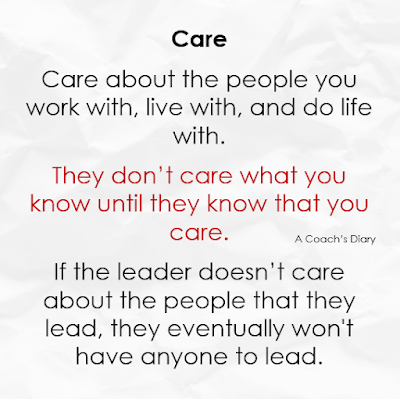"No significant learning occurs without a significant relationship."
- Dr. James Comer
My mother spent over 20 years in the trenches of education as a middle school principal. Anybody who has spent time on a middle school campus knows the joys and struggles of working with, teaching, and training middle school students. It takes a special kind of love, patience, and skill to reach and teach middle school kids.
One of the most impactful things my mother shared with me when I was first going into education was, "They don't care how much you know until they know how much you care."
What she meant was, kids don't care if you are the smartest, most accomplished teacher the world has ever seen; if you can't connect with them and build meaningful relationships with them, you won't be able to inspire and motivate them to learn and perform at the highest levels.
Effective teachers form authentic, caring relationships with their students (Cacciatore). Research shows that just one meaningful relationship can change someone's brain development, heal trauma, and improve learning and performance.
But today, in both education and sports, we are seeing an exodus unlike anything we have ever seen before. Teachers are leaving the profession at higher rates than ever before, and the transfer portal in college sports is filled with more athletes than ever as well.
Now more than ever, leaders and teachers in coaching and education could benefit from creating a culture that keeps people happy, hopeful, engaged enough to come back.
Gallup is a global analytics and advice firm that helps leaders and organizations solve their most pressing problems. They have done studies that show that engagement and job satisfaction increases when we are able to do what we do best every day. They also report that knowing that you are valued and feeling like you belong increases performance, job satisfaction, and well-being. The need for belonging is psychologically important.
Restorative Practices are a process through which we can build, sustain, and repair or restore relationships. It is a tool that we use to teach and train expectations and behavior. It is also a tool that can be used to help your team and teammates feel like they belong and like they are valued.
Restorative Practices were originally looked at as a way to address discipline issues, but it has morphed into a relationship-building and restoring tool, while also finding meaningful ways to teach and train behavior and finding meaningful ways to hold people accountable.
Restorative Practices might also be a tool that can help you attract and sign potential recruits and help integrate them into the team.
There are 4 major components to Restorative Practices:
1 - Community Building (Proactive) Circles
Circles, a symbol of community, are the tools we use to
build and sustain relationships. The goal of the circle is to get to know the
people on your team better through an intentional series of questions. It is a
simple but meaningful process where you sit or stand in a circle, ask a
question that allows you to get to know your team better, and give everyone the
opportunity to share, listen, and learn from and about each other.
2 - Treatment Agreements
We all respond to praise and criticism differently. A
Treatment Agreement allows us to share how we want to be treated, praised and
redirected. A Treatment Agreement asks 4 questions:
1 – How do we want teammates to treat each other?
2 – How does the coach want to be treated by the team?
3 – How does the team want to be treated by the coach?
4 – How are we going to treat the facilities?
3 - Affective Language
Words
have power! Our impact does not always match our intentions, and affective
language is a way to influence the people you work with by expressing how
someone’s actions affected you, impacted you, and made you feel.
Using ‘I feel ___ because ___’ statements are an effective way to acknowledge success, failure, hard work, or any other desirable or undesirable behavior.
4 - Restorative Circles
Conflict is a part of every relationship, and circles are
the tools we use to address conflict and harm. A Restorative Circle brings
together everyone who was harmed. A simple, 4-question protocol to use is:
1 – What happened?
2 – What was the intent?
3 – What was the impact?
4 – What do we need to do to make things right?
As of today, there are over 1,800 Division 1 and Division 2 basketball players in the transfer portal. Restorative Practices could be a valuable relationship-building and relationship restoring tool in the world of athletics.
Read more about the different tools within Restorative Practices here: Restorative Practices tools.
References:
1 - Cacciatore, Gina. Teacher-Student Relationships Matter. Harvard Graduate School of Education. https://www.gse.harvard.edu/news/uk/21/03/teacher-student-relationships-matter
2 - Washington, Ella. How to Use CliftonStrengths to Develop Diversity and Inclusion. Gallup. https://www.gallup.com/workplace/243251/cliftonstrengths-develop-diversity-inclusion.aspx












